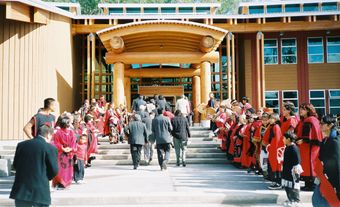This article was originally published in Maclean’s magazine on July 27, 1998. Partner content is not updated.
A mere 111 years after a group of northwestern B.C. natives first asked Ottawa and Victoria for a treaty confirming their title to hundreds of square kilometres of the remote and lovely Nass River valley, their descendants may finally be on the verge of satisfaction.Nisga'a Land Treaty
A mere 111 years after a group of northwestern B.C. natives first asked Ottawa and Victoria for a treaty confirming their title to hundreds of square kilometres of the remote and lovely Nass River valley, their descendants may finally be on the verge of satisfaction. Negotiators acting for 5,500 Nisga'a and the federal and provincial governments last week shook hands on a draft treaty that would confirm the band's right to a measure of self-government and nearly 2,000 square kilometres of land, while paying the Nisga'a $190 million in compensation for the release of the rest of their traditional territory. Band spokesmen welcomed the agreement as righting a historic wrong. "Many of our elders died fighting for our land," said chief tribal negotiator Joe Gosnell after the agreement. "I'm happy some of our elders could be here today."
Officials of both the federal and provincial governments, meanwhile, lauded last week's tentative settlement. It would, they said, pave the way for similar deals with other natives, most of whom never signed treaties with the Crown and whose combined land claims actually exceed the total area of British Columbia. But any celebration on that score was clearly premature. Far from bringing new momentum to the bogged-down negotiations with more than 50 other native groups in British Columbia, the draft deal with the Nisga'a faces intense hostility from other aboriginals and from the province's political opposition, albeit for entirely different reasons.
For the Nisga'a, though, it was a victory - at long last. Their leaders first travelled to Victoria in 1887 to plead for a treaty giving them assured access to land they had occupied for millennia. But British Columbia's premier at the time, William Smithe, rejected their plea with the caustic observation: "When whites first came among you, you were little better than wild beasts." It was not until a mid-1970s series of court decisions favoring aboriginal rights that Ottawa agreed to enter treaty talks with the band. It took more than a decade for the province to join the negotiations. An agreement in principle reached in 1996 has taken another two years to nail down in legal form. Now, in addition to land and cash, the draft treaty would see the Nisga'a - only 40 per cent of whom still live on their ancestral lands 800 km north of Vancouver - give up their tax-exempt status and receive self-government over culture and many social areas.
Once finalized, the treaty must be ratified first by the Nisga'a in a referendum, then by Parliament and the B.C. legislature. But that process promises to be stormy. The opposition Liberals, who have promised to vote against the deal in the B.C. legislature, charge that it will grant powers to the Nisga'a that, in some areas, will exceed those of either the federal or provincial governments. And, indeed, part of Section 27 of the draft agreement - posted on a government Web site - reads: "In the event of an inconsistency between Nisga'a laws and federal and provincial laws of general application, Nisga'a laws will prevail." (The section applies to only a handful of areas, including Nisga'a culture and language.) As well, the Liberals say, the agreement will restrict voting rights on native territory to people of Nisga'a descent. "It is clearly a racist argument," declares leader Gordon Campbell. "You're saying some people have rights that other people don't have, because of race. I don't see what else you call that."
If critics like Campbell oppose the Nisga'a deal for giving natives too much, other aboriginal groups object that it gives too little. Their position, moreover, has hardened since a landmark decision last December by the Supreme Court of Canada. That ruling, in a case brought by the Gitxsan and Wet'suwet'en hereditary chiefs (including the head of the Delgamuukw clan), whose traditional territory adjoins the Nisga'a's, confirmed the existence in principle of aboriginal title to traditional territories. In a decision penned by Chief Justice Antonio Lamer, the court also ruled that while aboriginal title does exist, specific claims remain to be proven on a "case-by-case" basis. But that qualification has largely been lost in the debate, with most native leaders insisting that the court simply confirmed their outright ownership of most of British Columbia's land mass.
Typical is the view of the fiercely independent Tsilhqot'in, who occupy 90,650 square kilometres of rugged territory north of the internationally famous Whistler ski resort. According to tribal co-ordinator Don Wise, the Delgamuukw decision confirmed the First Nations' historical view that "we have sovereignty over our territory, with all that that entails. It is ownership of the land and the resources." Significantly, the Tsilhqot'in's 5,000 members - whose forebears fought a short war against white encroachment in 1864 - style their tribal authority as the "Tsilhqot'in National Government," and insist it holds a status equal to either the federal or provincial governments.
That is not far off the official position of the 51 native groups who, since 1993, have been participating with Ottawa and Victoria in settlement talks choreographed by the B.C. Treaty Commission. In a January response to the court ruling, the First Nations Summit, which represents the participating native groups, declared: "Aboriginal title is a legal and proprietary interest in land. We assert our aboriginal title to all of B.C." The summit demanded that governments immediately stop granting third parties any rights over provincial resources, including timber-cutting permits and grazing licences on Crown land, "until our informed consent is obtained." The summit also asserted that "the provincial government has no jurisdiction over First Nations."
It is hardly a view with which the governments can be expected to agree - and they do not. While Dale Lovick, aboriginal affairs minister in Premier Glen Clark's provincial government, concedes that native groups have a right, confirmed by the Supreme Court decision, to be consulted on a wide range of land-use decisions affecting their former traditional territories, he flatly dismisses the notion that aboriginal title supercedes that of governments. "The provincial Crown," Lovick says, "is still asserting its right to manage the land of this province. We're not simply going to roll over."
Caught in the middle are hundreds, if not thousands, of non-aboriginal corporations and individuals. They rely on Crown land-use permits granted by the province to conduct businesses ranging from dude ranches to coal mines. But in the wake of the Delgamuukw decision, B.C. natives have gone on the offensive:
- In February, the Tsilhqot'in National Government told the local district forest manager that tree-cutting permits approved by the province were "no longer legally valid" and warned, without elaboration, that "you and your staff who continue with 'business as usual' are proceeding at your professional and private peril."
- In June, the Sechelt Indian band gave resource companies operating along the B.C. coast west of Vancouver 30 days to begin paying all mineral and stumpage licence fees either to a trust or to the courts, pending a determination of aboriginal title (the deadline expires this week; so far no companies have complied).
- Various other bands have asserted the right to block proposed developments on their traditional territories, including: a vineyard in the Okanagan Valley, an aluminum smelter near Port Alberni on Vancouver Island, a dam expansion in the Kootenays, and the sale of an airport in the Vancouver suburb of Pitt Meadows.
Such challenges, together with the lack of perceptible progress in the B.C. Treaty Commission negotiations, has led to rising alarm among resource companies. "We're the meat in the sandwich," says Gary Livingstone, president and CEO of the Mining Association of British Columbia, whose 40 member companies represent most of the province's mining industry. In a view widely shared by forest industry operators, Livingstone says: "We don't care who the landlord is - governments or aboriginal groups. But we don't know who the landlord is - we're pleading with government to get on this and settle this issue."
But other problems haunt the negotiations as well. Even before the Delgamuukw decision, the B.C. Treaty Commission publicly warned Ottawa and Victoria that without more funds, more negotiators and clearer mandates, treaty talks could easily drag on for decades. Conflicts among native groups themselves, meanwhile, present further obstacles, with many alleged traditional territories overlapping others. In one case, no fewer than three different bands claim the same portion of Vancouver that is a favorite destination of locals and tourists alike: the Vanier Park area of Kitsilano, where the Vancouver Museum, Planetarium and Maritime Museum are located.
Faced with pressure from all sides, the three parties to the B.C. Treaty Commission are meeting this week to review the process for negotiations. The most likely formula would see land and resource transfers move to the top of the agenda - giving bands a material stake in reaching early agreements - while leaving for later such touchy legal questions as the definition of self-government. Optimistically, John Watson, regional director in British Columbia for the federal Indian affairs department, says that an improved treaty process could be operating by as early as the fall. "People now realize," says Watson, "that there is a compelling economic imperative to getting treaties." Perhaps. But they remain far apart on almost every other bone of contention. And with the Nisga'a pact certain to become the test-case for every opposing view, the people of the Nass may be forced to wait a little longer still before they can truly celebrate their long-sought treaty.
Maclean's July 27, 1998

 Share on Facebook
Share on Facebook Share on X
Share on X Share by Email
Share by Email Share on Google Classroom
Share on Google Classroom


